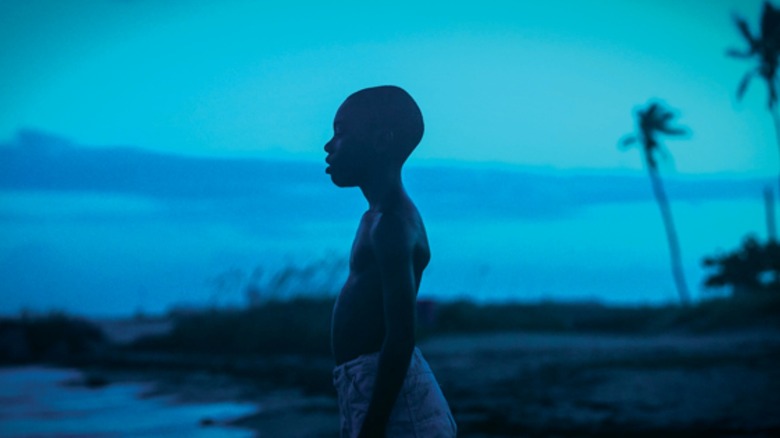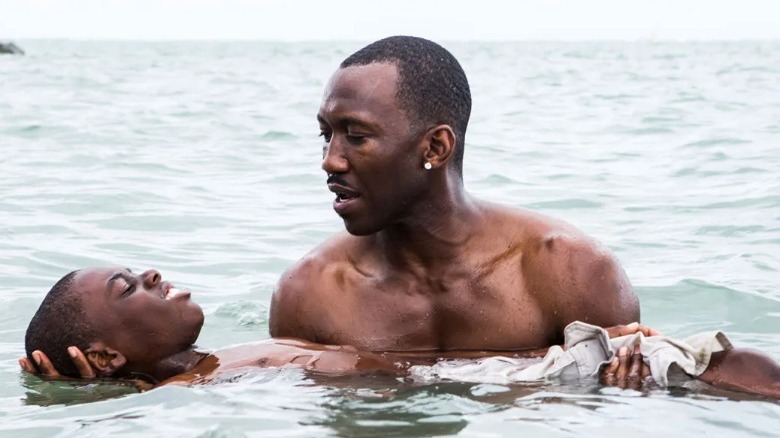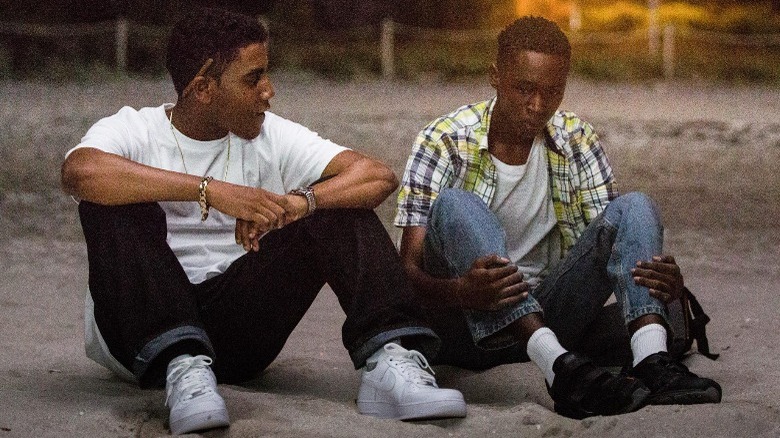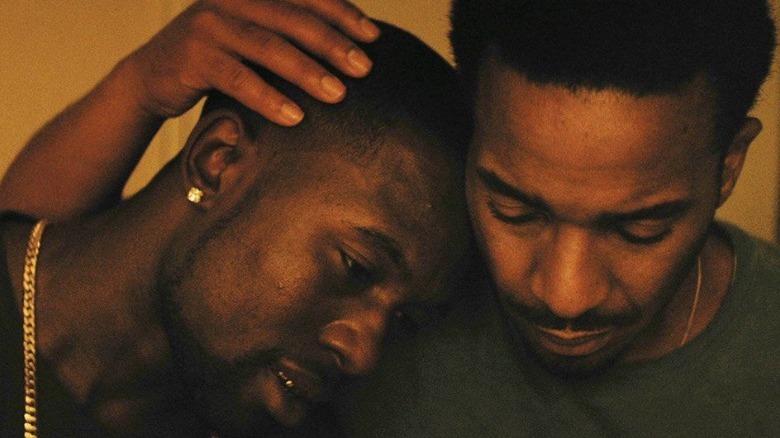Moonlight Ending Explained: Who Is You, Chiron?
In "Moonlight," Barry Jenkins crafts a haunting, beautiful triptych tracing the journey of Chiron, who struggles with the complex, intersectional nature of his identity at different points in life. The film explores different notions of Black masculinity that are intrinsically connected to different expressions of sexuality, with Chiron navigating these strands at the center. The reason why "Moonlight" shines as a beacon for powerful queer cinema is Jenkins's refusal to solely define his characters through the lens of race or sexuality alone — the film works around certain stereotypes only to shatter and redefine them in the end. This reclamation, which functions both on a narrative and thematic level, is emphatic in bringing Chiron's journey full circle towards the end of the film.
"Moonlight" opens with Chiron (Alex R. Hibbert), a shy and sensitive boy who is dubbed "Little" by the kids who bully him. Although he does not completely understand why he is perpetually cornered and mocked by those around him, there is an underlying sense of shame woven into his every utterance. Chiron, who is rejected by his peers for not conforming to heteronormative Black masculinity, does not yet understand what these notions mean, but carries a heavy, heavy burden nevertheless. Enter Juan (Mahershala Ali), who steps in as the boy's protector and gradually assumes the role of father figure. This encounter acts as a catalyst for Chiron's journey of self-discovery.
With attempts at self-discovery come doubts and questions, which are difficult to utter or resolve due to societal expectations of masculinity. How does Chiron decide to define himself? This is the central question in "Moonlight," which, in the end, is a tale that encourages us to embrace authentic self-expression and acceptance.
Little: learning to embrace who you are
The film's triptych outlines the different stages in Chiron's identity, which are attached to unique sets of circumstances that define his perception of the self. In part one, dubbed "Little," Chiron perceives himself through this socially-sanctioned nickname, which aims at mocking his queerness and inability to participate in performative masculinity. Under the gentle guidance of Juan and his girlfriend Teresa (Janelle Monáe), Chiron unlearns the harmful stereotypes associated with the labels hurled at him as an insult. The process is jarring, as he is unable to reconcile this newfound freedom with the neglectful, borderline abusive behavior of his mother, who treats Chiron with alternating acts of care and cruelty.
One of the most pivotal scenes in "Moonlight" is the one in which Juan takes Chiron to the beach for swimming lessons. This is a moment of transcendent connection between the two characters. Holding Chiron like a newborn about to receive baptism, Juan tells Chiron that he needs to decide who he is going to be, and nobody else can make this decision for him. This is a defining moment in Chiron's arc, as this is the first time he has been ushered into a safe space and asked to embrace authenticity, anchored by a father figure and the fluidity of the water that momentarily feels like home.
Although Juan is an example of healthy, layered masculinity, wherein he uses gentleness to guide Chiron through the perils of life, his role as caregiver is complicated. Later, when it is revealed that Juan is the one who sells drugs to Chiron's mother, Chiron understandably feels betrayed. Moreover, these feelings of found family and affinity are short-lived, as Juan dies inexplicably, leaving Chiron alone to navigate the turgid waters of life.
Chiron: experiencing tenderness and betrayal
Although Chiron (Ashton Sanders) finds solace in the maternal presence of Teresa, Juan's death and his increasing alienation from his own mother intensifies the turmoil inside him. The bullying at school worsens, with people like Terrell (Patrick Decile) donning masks of toxic, harmful masculinity to diminish Chiron's personal agency. Among all the chaos, Chiron experiences longing for a dear friend — his classmate Kevin, with whom he has a sexual encounter on the beach. The two boys kiss under the moonlight, sharing a moment of utter vulnerability while shattering all notions of performative identity. This brief moment of tenderness allows Chiron to accept himself, as he is no longer rejected for his sexuality, his masculinity, and his emotional vulnerability. Kevin makes him feel seen for who he truly is.
However, this brief acceptance is immediately followed by betrayal. At school, Kevin is forced to conform to performative hyper-masculinity, which prompts him to do nothing as Chiron gets beaten up by bullies. Kevin, who chooses societal validation over his bond with Chiron, fails the latter in more ways than one. This betrayal ignites cold anger in Chiron, who goes on to do something uncharacteristic: he smashes a chair over a bully's head, which leads to his immediate arrest.
While Chiron's resistance is a sign that he is finally ready to stand up for himself, it is also symbolic of giving into the same cycles of hyper-masculine violence that trigger these social injustices in the first place. Unfortunately, society succeeds in bullying Chiron into thinking that he can never be truly himself in a cruel, indifferent world. At this point, coming out/embracing his queerness is not an option for Chiron. As a result, he is forced to hide under layers of the same straight, performative masculinity that breaks him.
Black: homecoming and embracing authenticity
Now going by "Black," Chiron (Trevante Rhodes) has transitioned into adulthood by hiding himself in layers and layers of heteronormative, traditional Black masculinity. Chiron now sports an athletic build and adopts a tough-as-nails exterior, which are socially-acceptable tenets of a certain brand of perceived power. Despite exhibiting this carefully-crafted facade, the audience is immediately able to recognize Chiron's telltale vulnerability in Black's eyes. An adult Chiron lies sprawled under the moonlight, his muscular body curled up in a fetal position, which conveys the sense of alienation he feels from himself and the world. There's inexpressible exhaustion in the way he cannot be himself, some of which is healed after he chooses to reconcile with his mother.
However, Chiron is finally able to feel at home and return to himself after he meets Kevin (André Holland), who now works at a diner. The two converse and open up to one another. Kevin reaffirms the tenderness that the two once shared and explains how he had to give into heteronormativity for the sake of societal acceptance. These revelations are implicit, yet hard-hitting, allowing Chiron to finally accept himself unconditionally. He realizes that he no longer needs to hide from himself or pretend to conform to a standard that does not reflect his truth. "Who is you, Chiron?," Kevin asks, which is wordlessly answered with the two embracing silently. The scene cuts to Little standing on the beach under the moonlight: an enduring, beautiful final image of hope and intersectional acceptance.
Chiron has taken a major step towards embracing his sexual identity and its connection to his Black masculinity, bringing an end to his odyssey of self-discovery and acceptance. In many ways, it is a brand new beginning.



